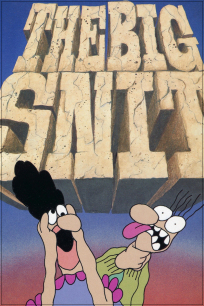Plot
A married couple sit in their front room playing a game of Scrabble. The husband is stumped in his next move, and the wife gets up to vacuum while he tries to think of a word. He switches on the TV for his favourite TV show, Sawing for Teens, and dozes off. Sawing for Teens is interrupted by an emergency broadcast in which it is announced that a worldwide nuclear war has broken out. The cat chews on the TV's electrical cord and knocks out the TV before the husband can see the announcement. When he awakens, he looks out the window to see chaos in the streets, without any idea what it means. He sneaks a peek at his wife's letters. The wife, also unaware of the news, returns to the game, notices her letters have been moved, and accuses her husband of cheating. They argue and the wife runs out of the room in tears.
The husband, feeling sorry for arguing, spots an old photo of him and his wife at a fair, prompting memories of themselves in happier times. He approaches her with a concertina and begins playing on it. She softens up and the two embrace. The cat sits by the door to be let outside, and the husband reaches for the doorknob. At that moment, a white glow emanates from the keyhole and the husband is vapourized. [1] He opens the door and the scene of chaos has been replaced by the sight of angels, clouds, and other heavenly objects. [2] The couple, unaware of the cataclysm that has taken place, marvel at the beauty of the scene and decide to return to their Scrabble game. [3]
This page is based on this
Wikipedia article Text is available under the
CC BY-SA 4.0 license; additional terms may apply.
Images, videos and audio are available under their respective licenses.

